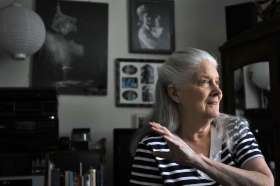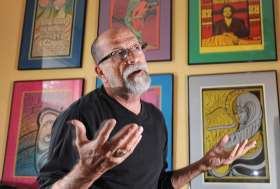|
Northeast Florida Nonprofit
Examining Needs of Older People in LGBT
Community
Matt Soergel, The Florida
Times-Union
April 23, 2012

BOB
SELF/The Times-Union
Vicki
Wengrow, who is 69 and lives in a
retirement community, talks about being
gay and growing older.

BOB MACK/The
Times-Union
ElderSource,
a nonprofit resource center for the
elderly, is reaching out to the LGBT
community and its older members, who may
face challenges and discrimination as they
look for care. Walter Fitzwater, 64, says
be believes he has people to turn to.
As if getting old wasn't tough
enough, add being gay to the equation
and it can be downright brutal.
Elderly gay people are often
vulnerable and isolated, said Linda
Levin, executive director of
ElderSource, a nonprofit resource center
for the elderly in Northeast Florida.
The pressure of being gay and
elderly is enough to drive some people
back into the closet, said Stu Maddux,
producer of a documentary on the topic.
"The bullies that were there at
the beginning of your life, we've found
that they're waiting for you near the
end of it too," he said. "And this time
you can't run very fast."
He'll be in attendance when his
film, "Gen Silent," screens May 17 at
the University Center at the University
of North Florida. The screening was
arranged by ElderSource, which has
started an initiative that looks at the
needs of older lesbian, gay, bisexual or
transgender people.
The group surveyed older gay
people and found common concerns about
aging. What legal protections will they
and their partner have? What reaction
will they get from those who live in
nursing homes or communities?
Some, estranged from their
families, wonder who will take care of
them when they need help. And some have
heard stories of ailing older gay people
getting poor treatment from the
caregivers charged with helping them,
stories which are told in "Gen Silent."
Some, said Levin, choose to
isolate themselves, fearing to reach out
for the services available to them.
You can feel pretty alone if
you let it get to you, said Vicki
Wengrow, a one-time English instructor
at area colleges and a massage therapist
for 33 years.
She was 29 when she came out as
a lesbian in 1972. She was a married
mother who had become an enthusiastic
member in Jacksonville of the women's
liberation movement, which made that
announcement much easier, she said with
a laugh.
She's 69 now, living in a
retirement community in Riverside. She's
had a few nasty phone calls, some
insensitive comments, she said. But
she's also found acceptance, even from
some of her most conservative, religious
acquaintances there.
Many people know of her
sexuality, she said, and most try to be
understanding. She doesn't have a
partner, which makes it easier.
"It's not like I'm
quote-unquote flaunting it," Wengrow
said. "As a couple of people here said,
'As long as you don't flaunt it.' "
Walter Fitzwater, 64, says he
wouldn't put up with such talk.
"For the gays who feel like
they're oppressed, they're bringing this
on themselves," he said.
Fitzwater was born in Cuba to a
Cuban mother and American father, a
Marine who was soon out of the picture.
He grew up there until leaving for South
Florida in 1961. He dropped out of the
University of Florida and moved to San
Francisco in 1972, where he came out.
He was diagnosed as HIV
positive in 1989 and moved to
Jacksonville the next year to be near
his mother and wait for death. Then he
decided to live. He's convinced that
he's remained moderately healthy by
living well and remaining positive,
along with the medications that became
available in the mid-1990s.
He's written and performed a
play, "Dialogue Between Me and My
Virus," all over Northeast Florida. And
he went back to Cuba in 2005 to teach
caregivers there how to deal with
patients with HIV.
Getting older isn't necessarily
going to be easy, Fitzwater said, but he
believes he has people to turn to: "I
have people who love me and I know if I
need something they'll help me.
Straight, gay bisexual, lesbian —
they'll help me."
Lynne Carroll, a UNF professor,
heads the LGBT Elder Task Force of
Northeast Florida, an offshoot of the
ElderSource initiative.
She said they want to continue
to learn what older gay people need and
want, while training caregivers and
organizations to better take care of
them.
Raising the visibility of the
issue is also paramount, Carroll said.
So is convincing gay people that they
can get access to the services they need
without having to hide who they are.
She went to an assisted-living
facility a couple of years ago, doing
research on gay and lesbian residents.
While there, she spoke to a staff
member.
"She said, 'Oh, we don't have
any of those here.' That is so funny,"
Carrol said. "That is a classic line
that you sometimes get from people. It's
innocent, but it makes you realize that
when you're one of a marginalized
minority, you may not be totally open
about who you are."
|



